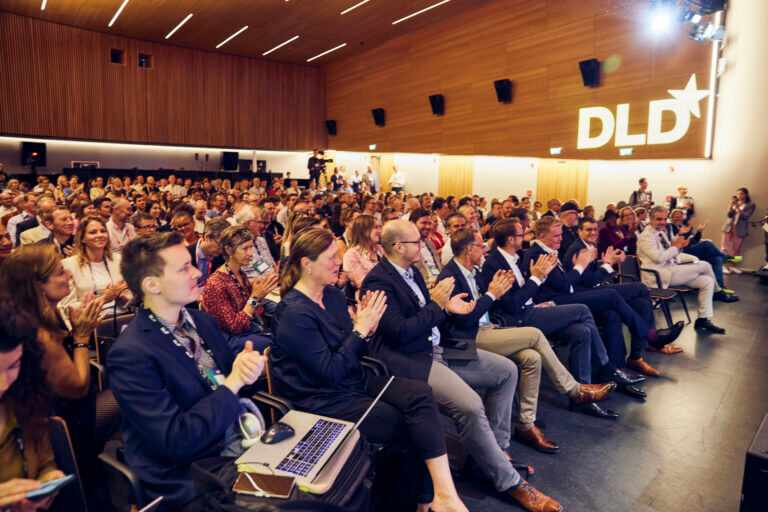AI and partner marketing – the balance between privacy and personalization is key

Mitgo team attended DLD AI Summit in Munich
The DLD AI Summit 2023 promised an exploration of the limitless potential of artificial intelligence, which was not exaggerated.
AI will transform every industry from mobility to health, from agriculture to media, reshaping our entire world. While interviewing Benedikt Franke (Munich Security Conference) and Moritz Schularick (Kiel Institute for the World Economy), journalist Andrew Keen (‘Keen on’ podcast) put it this way – we’re experiencing the Oppenheimer moment in mankind’s history? We are. New business models emerge, and global challenges remain unresolved in education, science, and politics.
DLD AI Summit gathered together scientists, politicians, entrepreneurs, and large businesses to have a conversation about how AI will and is already impacting decision-making processes and economic, social, and environmental challenges lying ahead.

The Mitgo team was thrilled to be part of this important conversation; here are our key learnings.
EU AI deal is necessary – we need regulations
It is clear that China is leading the way when it comes to speed and efficiency, but Europe and the US are still driving AI development. Eva Maydell, Member of the European Parliament, highlighted ion her passionate playdoer for rules and regulations that make sense the importance of sitting together at one table, and the importance of businesses and politics talking to one another.
Tech companies are enablers for upcoming AI features and new business models; however governments and public services are here to help thing go smoothly and to make sure the public is not being hold hostage for the new form of tech dictatorship.
To quote Andrew Keen, we need AI to create a new Denmark social economy model – worldwide.
Media are not out of the picture – curatorship is key
Martin Weiss, CEO of Hubert Burda Media, had a tough conversation with Solveigh Hieronimus, McKinsey & Company, where questions on content production costs an therefore the role of media have been asked. AI makes it possible to produce any given content in seconds, which makes the costs close to zero, he claimed. So where does it leave media? Can everyone and anyone now broadcast their own content to the woprldwide audience, and how can we differentiate AI-produced stories from the ones written by highly professional journalist (humans)?
We are confronted with an enormous amount of fakes, to quote Mr. Weiss. “The media will become a curator of all of this for consumers and readers.”
Advertising will have to rethink business models, too – and win trust of consumers at a new level
In the session called Decoding the Future of AI-driven Media Products and Advertising
Dan Oros (Creatopy) and Stefan Atanassov (Hubert Burda Media) discussed all the implications AI will have on the advertising industry. How would consumer react to ads produced entirely by AI? How would the message come across? And would new business models emerge?
There is no simple answer to all of these questions.
All we know for now is that, on one hand, consumers are extremely aware of privacy issues, and do not share their data he way advertisers might want. On the other hand, consumers value their time in endless searches for the right product that fits their – at times and increasingly often – individual requirements. There is a thin line between privacy-driven and data-based advertising, with brands and agencies solely relying on their own understanding on how much data is enough in order not to cross the line of intrusion resulting in annoying and useless ads.
Takeads, privacy-first data-centric network is one of the answers to this.
AI is there. Its our responsibility to make it work for long-term goals
Dex Hunter-Torricke from Google DeepMind emphasized that AI is more than chatbots and image generation. He held out the potential of an artificial general intelligence (AGI), which could hypothetically be able to carry out any intellectual task performed by humans.
Jonas Andrulis, founder and CEO of Aleph Alpha, made it clear that with everything AI is already capable of doing, one should not ignore what it cannot yet do. His appeal: “Take responsibility!”
Eva Maydell, Member of the European Parliament, called in her keynote speech to be more optimistic about the future of technologies and AI.
Trust and responsibility go hand in hand, and tech companies like Mitgo are not only fully aware of it, but already taking all necessary steps to shape the future with AI that might be brighter than Oppenheimer’ moment suggests.
Would like to find out more about our AI-driven solutions such as Instant Payout Pro? Reach out to our team, we are happy to hear from you.
Popular





